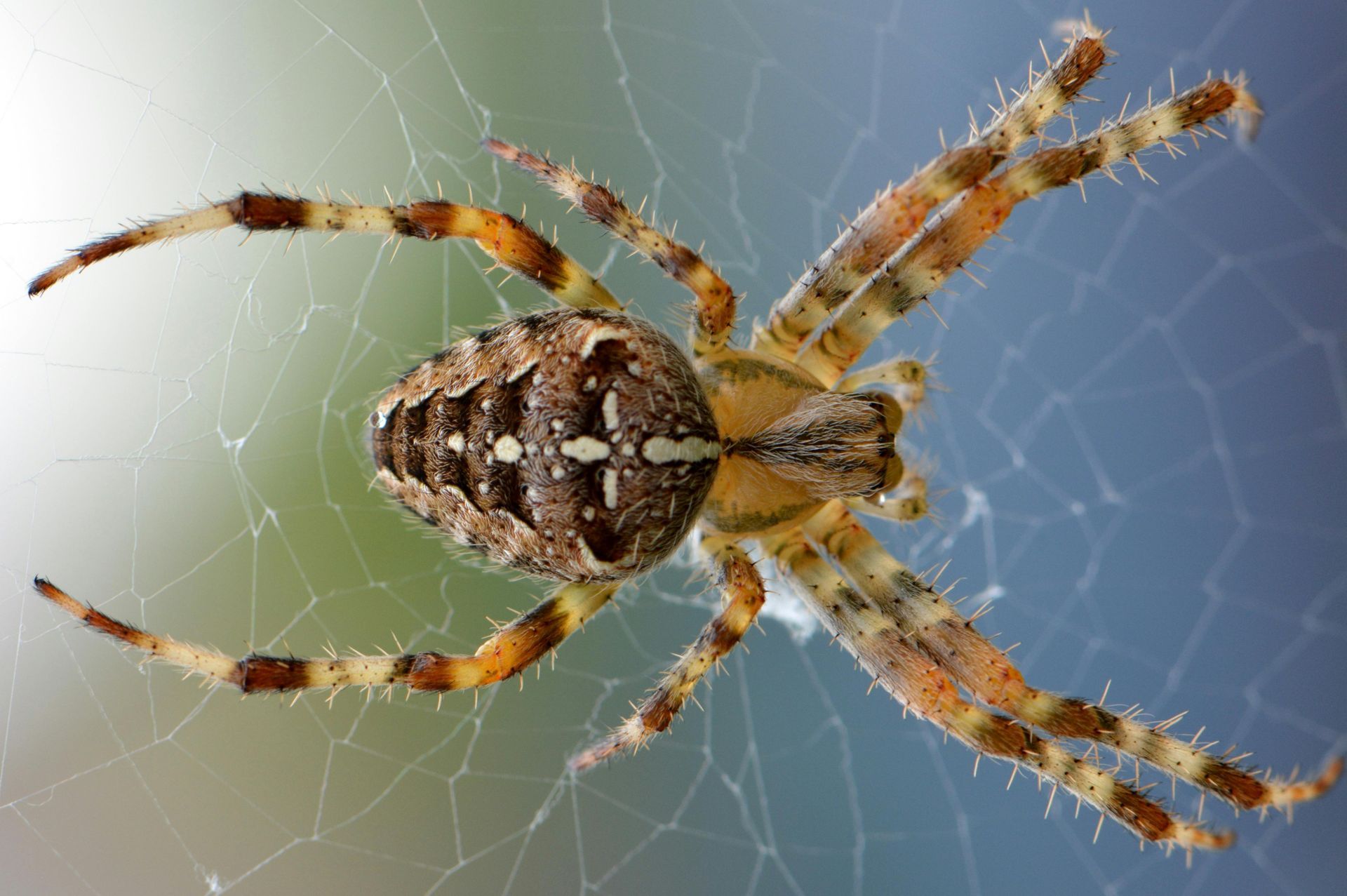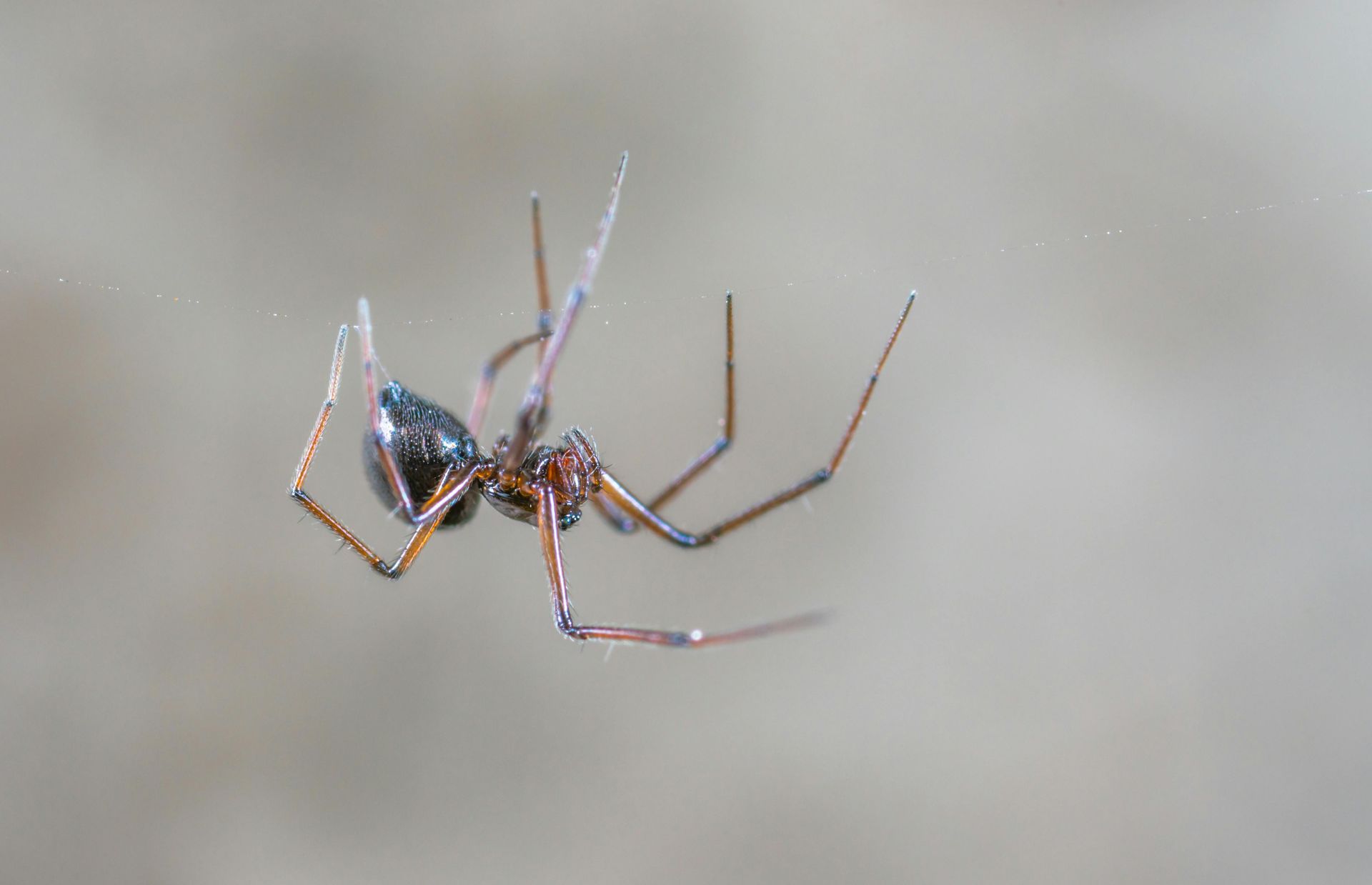Spiders
As a homeowner, understanding the types of spiders that may inhabit your home and how to manage them is essential for maintaining a safe and comfortable living environment. While many spiders are harmless and beneficial by controlling other insect populations, others, like the brown recluse or black widow, can pose health risks.
Knowing how to identify common household spiders, recognizing their habitats, and learning effective prevention and control measures can help you reduce spider populations and minimize the chances of unwanted encounters. Whether you're dealing with a few webs in the corner or a full-blown infestation, spider education equips you with the knowledge to protect your home and family, while ensuring that these eight-legged visitors are kept in check.

If you have any questions, here are a few of the frequently asked questions.
Spiders are common household pests, often found in basements, attics, and corners. While they help control other insects, their presence can cause discomfort, especially if venomous species like the black widow or brown recluse are involved. Understanding spider behavior and how to manage them is key to maintaining a safe home. Homeowners frequently have questions about spider control, such as why they appear and how to eliminate them.
Here are some common FAQs to help address your concerns:
1. Why are there so many spiders in my home?
Spiders often enter homes in search of food, water, or shelter. They are attracted to places with other insects, which serve as their food source. Seasonal changes can also drive them indoors.
2. Are all spiders in my home dangerous?
Most spiders are harmless and do not pose a threat to humans. However, some, like the black widow or brown recluse, can be dangerous and may require professional removal.
3. How can I prevent spiders from entering my home?
Keep your home clean and clutter-free, seal cracks and gaps around windows and doors, reduce outdoor lighting (which attracts insects), and regularly clean areas where spiders may hide, such as basements, attics, and storage spaces.
4. What should I do if I find a spider nest or egg sac?
It is best to remove the nest or egg sac carefully and dispose of it in a sealed bag. For large infestations, it is recommended to call a pest control professional.
5. What are the most effective methods for controlling spiders?
Effective spider control includes removing webs, using insecticides targeted at spiders, sealing entry points, and reducing their food sources by controlling other pests in the home.
6. Do spiders bite, and what should I do if I get bitten?
While most spiders do not bite humans, some may if they feel threatened. If bitten, clean the area with soap and water, apply ice to reduce swelling, and seek medical attention if symptoms worsen or if the spider is suspected to be venomous.
7. How can I tell if a spider is venomous
Venomous spiders like the black widow and brown recluse have distinct markings and behaviors. However, identification can be tricky, so it is best to consult a professional if you are unsure.
8. Can spider infestations be completely eliminated?
While it's challenging to completely eliminate spiders, regular pest control treatments, proper sanitation, and preventive measures can significantly reduce their numbers and prevent infestations.
9. Are there any natural methods for repelling spiders?
Yes, natural methods such as using essential oils like peppermint, eucalyptus, or citrus can help repel spiders. However, these methods may not be as effective for severe infestations.
10. When should I call a professional for spider control?
If you have a persistent spider problem, see venomous spiders, or have a large infestation, it's best to call a professional pest control service to assess and treat the issue effectively.
Understanding the types of spiders in your household

A professional spider exterminator is highly trained to identify the specific spider species infesting your home, which is critical for effective treatment and control.
By thoroughly inspecting your property, including basements, attics, garages, and exterior areas, the exterminator can locate spiders, their webs, and potential nesting sites. They have the expertise to differentiate between harmless spiders and more dangerous species, such as black widows or brown recluses, which require immediate attention.
Through proper identification, they can recommend targeted treatments that are safe and effective, ensuring the right method is used for each species. Additionally, the exterminator can provide guidance on preventing future infestations by identifying entry points and environmental factors that attract spiders. This comprehensive approach ensures a long-term solution to your spider problems.
1. House Spider (Parasteatoda tepidariorum)
- Also known as the common house spider, these are small to medium-sized spiders that create tangled webs in corners, basements, and attics.
- They are generally harmless to humans and help control other insect populations.
2. Cellar Spider (Pholcus phalangioides)
- Often referred to as "daddy longlegs," these spiders have very long, thin legs and are commonly found in basements, cellars, and dark corners.
- They are not harmful to humans and are known for their ability to hunt and feed on other spiders.
3. Wolf Spider (Lycosidae family)
- Large, robust spiders that do not spin webs but actively hunt their prey.
- They are often found near doors, windows, and basements. While their appearance can be intimidating, they are generally not dangerous.
4. Brown Recluse Spider (Loxosceles reclusa)
- Recognizable by the violin-shaped marking on their back, brown recluses prefer dark, undisturbed areas such as closets, attics, and storage boxes.
- Their bite can be medically significant, so professional assistance is recommended if they are found.
5. Black Widow Spider (Latrodectus spp.)
- Known for their shiny black body with a distinctive red hourglass marking on the abdomen.
- They are usually found in garages, basements, and outdoor sheds. Their bite is venomous and requires medical attention.
6. Hobo Spider (Eratigena agrestis)
- Medium-sized spiders that build funnel-shaped webs, often found in basements and window wells.
- Their bite was once thought to be dangerous, but recent studies show they are generally harmless to humans.
7. Orb-Weaver Spider (Araneidae family)
- Known for creating large, circular webs often seen in gardens, porches, and near outdoor lighting.
- They are beneficial for pest control and pose no threat to humans.
8. Jumping Spider (Salticidae family)
- Small spiders with a stout body and a distinctive, often colorful appearance. They are known for their agile jumping ability.
- They are not harmful to humans and are often found on walls, windows, and ceilings.
9. Yellow Sac Spider (Cheiracanthium spp.)
- Pale yellow to light green in color, these spiders build small, sac-like webs in corners, ceilings, and behind furniture.
- They can bite if provoked, causing mild pain and irritation, but they are generally not dangerous.
10. False Widow Spider (Steatoda spp.)
- Often mistaken for black widows, these spiders have a bulbous body and dark color, but lack the characteristic red hourglass marking.
- They are typically found in dark corners, garages, and basements and pose little threat to humans.
Spider control services for a hassle-free experience.
At GetLocal Services, our platform's transparent pest control pricing eliminates the need for price shopping. Our system provides you with the best price based on the experience and qualifications of our thoroughly vetted exterminators.
Our professional network members undergo a rigorous vetting process to ensure they meet our high standards. This guarantees that you receive top-quality service at a fair price, making your experience with us completely hassle-free.
Avoiding Annoying Sales Calls
One significant advantage of using GetLocal Services is avoiding the annoyance of multiple sales calls from vendors vying for your business.
Once you select an exterminator through our platform, you won’t be bombarded with follow-up calls from other vendors. This ensures a stress-free experience, allowing you to easily focus on resolving your ant problem.
Our professionals are available in your area if you need a spider exterminator.
If you’re facing a spider infestation, our local exterminators are here to help. We specialize in treating the specific types of spiders in your area, using effective methods to eliminate the problem and prevent future issues. Contact us today to schedule an inspection and keep your home pest-free.
DELAWARE
FLORIDA
GEORGIA
NEW JERSEY
PENNSYLVANIA
NORTH CAROLINA

Money-Back Guarantee!
Unhappy with the service? We'll send another provider. Still unsatisfied? Our money-back guarantee will make it right.
GetLocal Hassle-Free Home Services
ARE YOU A HOME SERVICES PROFESSIONAL?
Partner with us to connect with homeowners who seek trusted professionals, boosting your visibility and reputation in your community.

SERVICES
TOP LOCAL SERVICE AREAS
- New Jersey
- North Carolina
- Florida
- Georgia
- Pennsylvania
- Delaware
- USA
JOIN OUR MAILING LIST
Sign up for home services tips and more
Join the Newsletter
We will get back to you as soon as possible
Please try again later
Copyright, GetLocal Services, LLC. | All Rights Reserved. | Terms of Use | Privacy Policy








